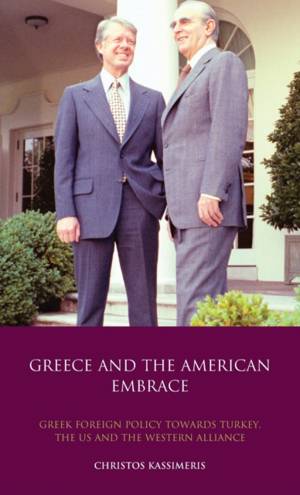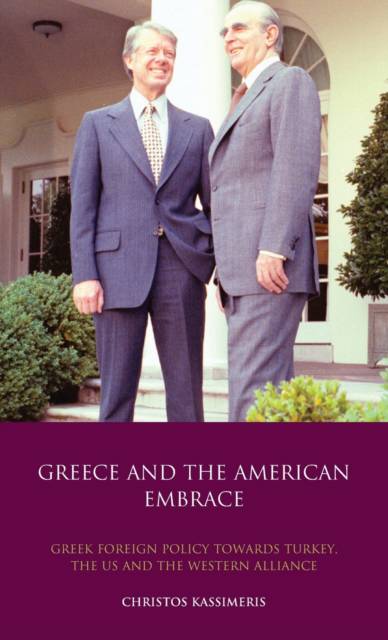
- Retrait gratuit dans votre magasin Club
- 7.000.000 titres dans notre catalogue
- Payer en toute sécurité
- Toujours un magasin près de chez vous
- Retrait gratuit dans votre magasin Club
- 7.000.0000 titres dans notre catalogue
- Payer en toute sécurité
- Toujours un magasin près de chez vous
Greece and the American Embrace
Greek Foreign Policy Towards Turkey, the US and the Western Alliance
Christos Kassimeris
296,95 €
+ 593 points
Description
During the Cold War era, relations between Greece and Turkey attracted the interest of the two superpowers, affected the objectives of the European Community and NATO and were regularly discussed within United Nations channels. Whereas existing studies on Greco-Turkish relations tend to focus on the various disputes between the two states of the Eastern Mediterranean and illustrate how continuous antagonism and aggression have dominated their interstate affairs, 'Greece and the American Embrace: Greek Foreign Policy Towards Turkey, the US and the Western Alliance' concentrates on the prospect of foreign intervention during the Cold War and considers the events and facts that brought about the conflict in the first place. Although a significant number of studies imply, or clearly support, the potential for foreign interference in Greece's domestic political environment and external affairs and the related conspiracy theories, few have exclusively concentrated their interest in exploring these allegations.
Greece's relations with external powers constituted colourful events in contemporary history and became determining factors in the formation of Greek foreign policy. In fact, the assumption that the role of external powers was highly influential granted all the omnipresent advocates of 'conspiracy theories' a unique opportunity to call for Greece's disengagement from the western camp. Kassimeris makes extensive use of all relevant documentation to challenge the issue of 'foreign intervention' and the ways in which it encouraged speculation with regard to the objectives of Greek foreign policy, while also undermining the relationship between Greece and her western allies. Previously unpublished sources from the Congressional Reports, Karamanlis Archives, National Security Study Memorandums, Greek Parliamentary Proceedings, UN Resolutions and the US Department of State Documents are also included.
Greece's relations with external powers constituted colourful events in contemporary history and became determining factors in the formation of Greek foreign policy. In fact, the assumption that the role of external powers was highly influential granted all the omnipresent advocates of 'conspiracy theories' a unique opportunity to call for Greece's disengagement from the western camp. Kassimeris makes extensive use of all relevant documentation to challenge the issue of 'foreign intervention' and the ways in which it encouraged speculation with regard to the objectives of Greek foreign policy, while also undermining the relationship between Greece and her western allies. Previously unpublished sources from the Congressional Reports, Karamanlis Archives, National Security Study Memorandums, Greek Parliamentary Proceedings, UN Resolutions and the US Department of State Documents are also included.
Spécifications
Parties prenantes
- Auteur(s) :
- Editeur:
Contenu
- Nombre de pages :
- 296
- Langue:
- Anglais
- Collection :
Caractéristiques
- EAN:
- 9781845118761
- Date de parution :
- 02-02-10
- Format:
- Livre relié
- Format numérique:
- Genaaid
- Dimensions :
- 140 mm x 218 mm
- Poids :
- 498 g

Les avis
Nous publions uniquement les avis qui respectent les conditions requises. Consultez nos conditions pour les avis.






